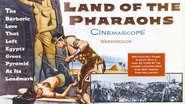jllewell
The one thing I did like about this was what everybody else hated... that there was no obvious good guy! That's what I loved when I first saw it at 7yrs old, and that's what I love now... all the 50's spectacle and nonsense, glamour and spangles, without the very 'disturbingly obvious' one faceted good guy.I found these silly people with their silly dialogues more real, as a consequence, even at that tender age.And I always was attracted to the macabre and gruesome, so the ending was perfect for me; I found it totally satisfying at the time. So much so, that I remembered the film and it's title for many years, after other, more polished films had faded.Silliness on a grand scale, and yet there is quite a dose of REAL flavour in there.
Keith Orr
As tribute to the all-conquering mighty Pharaoh Khufu, Jack Hawkins, Princess Nellifer, Joan Collins, offers herself in place of spoils to fill the pharaoh's treasure vaults given that she's just a poor ruler from an even poorer country. In no time at all, she becomes the fave of the pharaoh using her seductive wiles and allure in an ambitious scheme to usurp the throne, letting nothing and no-one, including the current queen, her son and pharaoh himself stand in her way. Long regarded by many in Hollywood as the poor man's Liz Taylor, Collins' makes the most of her own flawless beauty, and, talent as a legitimate actress in a once-in-a lifetime role as Nellifer. She even manages to overshadow and upstage Hawkins in their scenes together. Other points of interest include our being afforded an insider's POV of how the pyramids might have been constructed from drawing board stage and labyrinthine interior to stone apex. Filmed on location, director Howard Hawks enlisted some 9,787 extras actually recruiting from the ranks of the modern Egyptian Armed Forces. Novelist William Faulkner co-wrote (but didn't necessarily improve upon) the screenplay. Spoiler alert: In the classic tradition of Greek tragedy, Collins' receives her just reward in what has to be the ultimate cinematic revenge.
LeonLouisRicci
To be Totally Honest, Howard Hawks Movies all Look Artificial. As Entertaining as some may be, they Look Staged. If Auteurs by Definition have Stylish Signatures, this is One of Hawk's Charms/Drawbacks. The Thing (1951), The Big Sleep (1946), Rio Bravo (1959), just to name a Few of His more Celebrated "Masterpieces" all Appear Staged and Presented, and for Better or Worse it is Undeniable.Ironically, this one, Considered by Most a Failure, is Somewhat Removed from that because of the Necessity for the Director to be Panoramic and Expansive. So the Staginess doesn't Work Against Hawks here, although some Stiffness Remains, it is some other Things like Miscasting and a Severely Corny Script and Dialog.The Movie, with its CinemaScope is Magical, the Costumes, the Colorful Palette, the Mighty Musical Score, all make this Watchable like some sort of Postcard from Antiquity. But, Oozing in on its Serious Scenario of Megalomania, Greed, and Tyranny is a Fifties Mindset. The Film in all its Grandeur is Full of Clunk. There is Enough here to make it a Pleasurable Viewing, it's Expensive Enough and it is a Showy, but Shallow Story that has Misplaced its Vision with a Contrived and Underwritten Exposure of One of the Most Extravagant and Interesting Periods in Human History.
wes-connors
About 5,000 years ago in Egypt, pharaoh Jack Hawkins (as Khufu) returns from a successful war, loaded with golden treasure and slaves for his collection. Away three months with his conquering men, Mr. Hawkins cleans up and has sex with beautiful wife Kerima (as Nailla). Hawkins loves gold and wants to take it with him to the afterlife. He has robbed graves and knows he needs to build an impenetrable tomb in order to keep his gold forever. For this purpose, Hawkins builds one of the Great Pyramids of Egypt...The film's narrator estimates three million huge blocks of stone are used to construct the pyramid...Enslaved architect James Robertson Justice (as Vashtar) plans the building. He wants payment to be freedom for his people - especially the son who kneels up to become handsome Dewey Martin (as Senta). Workers include slaves and others toiling in return for godly Hawkins' promise of life after death. After 15 years, pretty princess Joan Collins (as Nellifer) arrives. After she mouths off to Hawkins, he has her whipped, wearing a pointy bra and harem pants. She becomes one of Hawkins' wives, then plots against him...Ms. Collins is beautifully proportioned..."Land of the Pharaohs" was produced and directed by Howard Hawks, so everyone knew where to send congratulations or condolences. This film received most of the latter.Ordering a lot of medium and long shots, Mr. Hawks may have thought CinemaScope would take care of everything else. It is strange to read William Faulkner as one of the film's writers; we can only wonder what he was drinking, or not drinking, for his participation. The story should have been told from the perspective of "Vashtar" (Justice), who harbored the secret that "Senta" (Martin), seductively targeted by "Nellifer" (Collins), was the illegitimate son of "Khufu" (Hawkins). Lack of characterization, stand kneel or walk acting, and poor direction ruined a good plot and great ending.***** Land of the Pharaohs (6/24/55) Howard Hawks ~ Jack Hawkins, Joan Collins, Dewey Martin, James Robertson Justice



